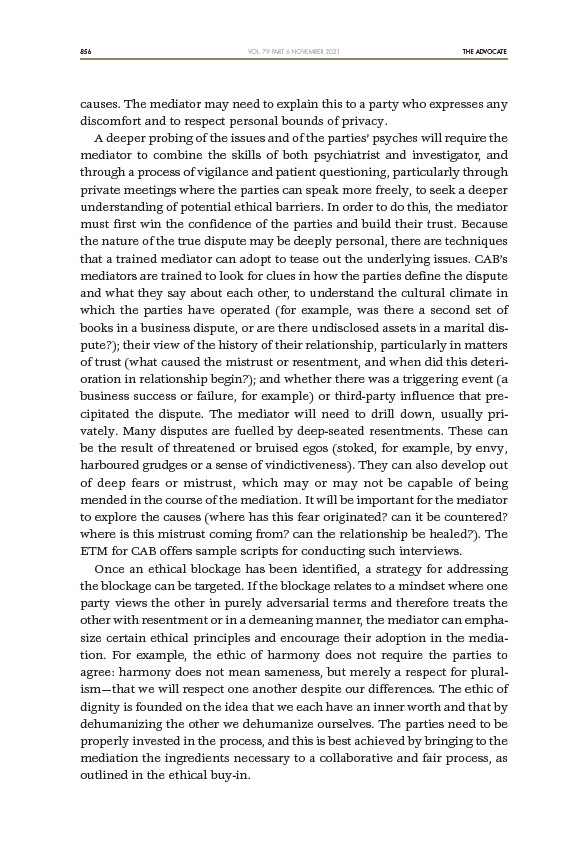
856 THE ADVOCATE
VOL. 79 PART 6 NOVEMBER 2021
causes. The mediator may need to explain this to a party who expresses any
discomfort and to respect personal bounds of privacy.
A deeper probing of the issues and of the parties’ psyches will require the
mediator to combine the skills of both psychiatrist and investigator, and
through a process of vigilance and patient questioning, particularly through
private meetings where the parties can speak more freely, to seek a deeper
understanding of potential ethical barriers. In order to do this, the mediator
must first win the confidence of the parties and build their trust. Because
the nature of the true dispute may be deeply personal, there are techniques
that a trained mediator can adopt to tease out the underlying issues. CAB’s
mediators are trained to look for clues in how the parties define the dispute
and what they say about each other, to understand the cultural climate in
which the parties have operated (for example, was there a second set of
books in a business dispute, or are there undisclosed assets in a marital dispute?);
their view of the history of their relationship, particularly in matters
of trust (what caused the mistrust or resentment, and when did this deterioration
in relationship begin?); and whether there was a triggering event (a
business success or failure, for example) or third-party influence that precipitated
the dispute. The mediator will need to drill down, usually privately.
Many disputes are fuelled by deep-seated resentments. These can
be the result of threatened or bruised egos (stoked, for example, by envy,
harboured grudges or a sense of vindictiveness). They can also develop out
of deep fears or mistrust, which may or may not be capable of being
mended in the course of the mediation. It will be important for the mediator
to explore the causes (where has this fear originated? can it be countered?
where is this mistrust coming from? can the relationship be healed?). The
ETM for CAB offers sample scripts for conducting such interviews.
Once an ethical blockage has been identified, a strategy for addressing
the blockage can be targeted. If the blockage relates to a mindset where one
party views the other in purely adversarial terms and therefore treats the
other with resentment or in a demeaning manner, the mediator can emphasize
certain ethical principles and encourage their adoption in the mediation.
For example, the ethic of harmony does not require the parties to
agree: harmony does not mean sameness, but merely a respect for pluralism—
that we will respect one another despite our differences. The ethic of
dignity is founded on the idea that we each have an inner worth and that by
dehumanizing the other we dehumanize ourselves. The parties need to be
properly invested in the process, and this is best achieved by bringing to the
mediation the ingredients necessary to a collaborative and fair process, as
outlined in the ethical buy-in.